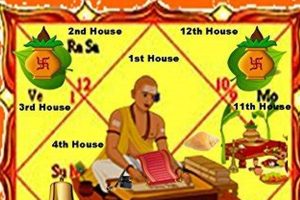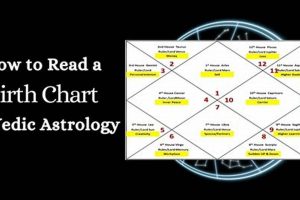In Vedic astrology, the dwarf planet considered the farthest celestial body within our solar system represents transformation, destruction, and regeneration. Its influence is associated with upheaval and dramatic shifts, often forcing a confrontation with the subconscious and deep-seated psychological patterns. For example, this celestial body’s placement in a birth chart can indicate areas of life where profound change and rebirth are likely to occur.
While not traditionally a part of the classical Vedic pantheon, the planet’s influence is increasingly studied within the context of modern Vedic practice. Its slow movement through the zodiac signs means its impact is generational, shaping the collective unconscious and influencing broad societal trends. Understanding its position can offer valuable insights into the cyclical nature of life, death, and renewal, allowing for greater awareness of underlying transformative energies. Its study can provide a framework for navigating periods of intense change and harnessing the power of destruction for positive growth and evolution.
Further exploration of this celestial body’s significance in Vedic astrology will cover its influence on individual birth charts, its interaction with other planets, and its implications for various life domains, such as career, relationships, and spirituality.
These tips offer guidance on how to navigate the profound influence associated with the outermost planet in our solar system within a Vedic astrological framework.
Tip 1: Embrace Change: Resistance to transformation only intensifies its impact. Acceptance and adaptability are key to navigating the often-turbulent energies associated with this planet. Recognize change as an opportunity for growth and evolution.
Tip 2: Explore the Shadow Self: This planet’s energy compels introspection and confrontation with hidden aspects of the self. Engaging in self-inquiry practices, such as meditation or journaling, can facilitate this process.
Tip 3: Understand Generational Influences: Recognizing the generational impact of this planet provides context for broader societal shifts and trends. Awareness of these influences can help individuals understand their place within larger cycles of change.
Tip 4: Seek Professional Guidance: Consulting with an experienced Vedic astrologer can offer personalized insights into this planet’s influence in a birth chart. This can provide tailored guidance for navigating specific life challenges and opportunities.
Tip 5: Observe Planetary Transits: Paying attention to the transits of this celestial body can provide valuable insights into periods of heightened transformation. This awareness allows for proactive preparation and conscious engagement with these powerful energies.
By understanding and integrating these tips, individuals can navigate the intense, transformative energies associated with this celestial body with greater awareness and resilience. This understanding can lead to profound personal growth and a deeper connection with the cyclical nature of life, death, and rebirth.
These insights provide a foundation for understanding the complexities of this planet within Vedic astrology. Further exploration may involve examining specific case studies and delving deeper into the nuances of its interaction with other planetary bodies.
1. Transformation
Transformation, a core principle in Vedic astrology, finds a potent significator in the dwarf planet Pluto. While not traditionally included in classical Vedic texts, Pluto’s influence is increasingly recognized in modern interpretations, offering profound insights into the processes of death, rebirth, and evolution. This section explores key facets of transformation as related to Pluto’s energy within the Vedic framework.
- Psychological Metamorphosis
Pluto’s energy catalyzes deep psychological shifts, often bringing buried emotions and subconscious patterns to the surface. This can manifest as intense periods of introspection, shadow work, and the dismantling of outdated belief systems. Examples include sudden shifts in perspective, letting go of long-held attachments, and facing deep-seated fears. In Vedic astrology, this process is seen as essential for spiritual growth and aligning with one’s true purpose.
- Karmic Unveiling
Pluto is associated with karmic debts and their resolution. Its transit through a birth chart can trigger events that force confrontation with past actions and unresolved issues. This process, while potentially challenging, offers opportunities for liberation from limiting karmic patterns and the potential for profound healing. This can manifest through unexpected encounters, sudden life changes, or facing consequences of past actions.
- Power Dynamics
Pluto’s influence extends to power dynamics, both personal and societal. It can signify the misuse of power, manipulation, and control, but also empowerment, resilience, and the ability to overcome adversity. In Vedic astrology, understanding Pluto’s placement can shed light on how an individual navigates power dynamics and their capacity for personal transformation in the face of external pressures.
- Spiritual Evolution
Pluto’s transformative power ultimately serves the purpose of spiritual evolution. By breaking down old structures and forcing confrontation with the shadow self, it creates space for profound growth and the emergence of a more authentic and integrated individual. This evolutionary process is seen as a journey of self-discovery, leading to greater self-awareness and a deeper connection to one’s spiritual path.
These facets of transformation, when viewed through the lens of Pluto in Vedic astrology, provide a framework for understanding the complex processes of change and evolution. By recognizing Pluto’s influence, individuals can gain valuable insights into their own karmic journey and the potential for profound personal and spiritual growth. This understanding empowers individuals to navigate life’s challenges with greater awareness and resilience, ultimately leading to a deeper understanding of their purpose and place within the cosmos.
2. Regeneration
Regeneration, a fundamental concept in Vedic astrology, finds a powerful expression through the influence of Pluto. Although not a traditional planet in classical Vedic texts, Pluto’s association with death and rebirth aligns seamlessly with the regenerative principles inherent in this ancient system. This section explores the multifaceted nature of regeneration as it relates to Pluto’s energy within a Vedic astrological context.
- Rise from Ashes
Pluto’s transformative power often necessitates a process of destruction before regeneration can occur. Like the mythical phoenix rising from ashes, Pluto’s influence can dismantle outdated structures and patterns, clearing the way for new beginnings. This can manifest as the ending of relationships, career changes, or the shedding of limiting beliefs. In Vedic astrology, these experiences are viewed not as endings, but as opportunities for profound renewal and growth. For example, a challenging Pluto transit might lead to the dissolution of a stagnant career path, paving the way for a more fulfilling and aligned vocation.
- Spiritual Renewal
Pluto’s influence extends beyond the material realm, impacting spiritual growth and evolution. Its energy can catalyze deep inner transformation, prompting individuals to confront their shadow selves and embrace their authentic nature. This process of spiritual renewal often involves facing difficult emotions, releasing past traumas, and cultivating greater self-awareness. This can manifest as increased interest in spiritual practices, a deeper connection to one’s intuition, or a shift in values and priorities. For instance, an individual experiencing a Pluto transit might feel drawn to meditation or other introspective practices, leading to profound insights and spiritual breakthroughs.
- Cyclicality of Life
Pluto’s association with death and rebirth underscores the cyclical nature of life, a core principle in Vedic astrology. Just as nature experiences cycles of growth, decay, and renewal, so too do individuals undergo periods of transformation and rebirth. Pluto’s influence highlights the importance of embracing these cycles, recognizing that endings are necessary for new beginnings. This understanding fosters acceptance of change and resilience in the face of life’s inevitable ups and downs.
- Harnessing Transformative Power
Pluto’s energy, while intense, holds immense potential for positive change. By understanding its influence, individuals can consciously engage with the regenerative process, harnessing its transformative power for personal growth and evolution. This involves embracing introspection, cultivating self-awareness, and actively participating in the dismantling of outdated patterns. For instance, an individual aware of Pluto’s transit through their chart might choose to engage in therapy or shadow work, facilitating deep healing and transformation.
These facets of regeneration, when viewed through the lens of Pluto in Vedic astrology, provide a framework for understanding the cyclical nature of life, death, and rebirth. By recognizing Pluto’s influence, individuals can navigate periods of transformation with greater awareness and resilience, ultimately leading to profound personal and spiritual growth. This understanding allows for a deeper appreciation of the transformative power inherent within life’s challenges and the potential for renewal and rebirth that lies within each ending.
3. Subconscious Upheaval
Vedic astrology recognizes the profound impact of planetary influences on the subconscious mind. Pluto, in this context, acts as a catalyst for upheaval, bringing hidden fears, desires, and unresolved karmic patterns to the surface. Understanding this influence is crucial for navigating the transformative periods Pluto signifies.
- Unearthing Hidden Patterns
Pluto’s transit through a birth chart can trigger the unearthing of deep-seated psychological patterns. These patterns, often formed in early life or even past lives, can influence behavior and decision-making in ways individuals may not consciously recognize. Examples include recurring relationship challenges, self-sabotaging tendencies, or unexplained fears. Vedic astrology suggests that Pluto’s influence provides an opportunity to address these patterns, leading to greater self-awareness and personal growth. Confronting these subconscious influences can be challenging, but ultimately facilitates healing and transformation.
- Intensified Emotions
Pluto’s energy often correlates with periods of intense emotional experiences. Suppressed emotions, unresolved traumas, and deep-seated fears can surface during Pluto transits, leading to periods of emotional upheaval. This can manifest as anxiety, anger, or profound grief. Vedic astrology emphasizes the importance of processing these emotions constructively, allowing for release and integration rather than suppression. This process can be facilitated through therapeutic practices, meditation, or other forms of self-inquiry.
- Confrontation with the Shadow Self
Pluto’s association with the underworld and hidden realms connects it to the concept of the “shadow self” in Vedic astrology. This refers to the aspects of personality that are often repressed or denied, including negative emotions, fears, and undesirable traits. Pluto’s influence brings these shadow aspects to light, forcing a confrontation that can be both challenging and liberating. This process of integration leads to greater wholeness and psychological maturity.
- Karmic Reckoning
Pluto is often associated with karmic patterns and their resolution. Its transits can bring about situations that force individuals to confront unresolved karmic debts from past lives or actions. This can manifest as unexpected challenges, relationship conflicts, or life-altering events. Vedic astrology suggests that these experiences offer opportunities for karmic cleansing and the potential for profound spiritual growth.
These facets of subconscious upheaval, when viewed through the lens of Pluto in Vedic astrology, provide a framework for understanding the transformative power of this celestial body. By recognizing Pluto’s influence on the subconscious, individuals can navigate these intense periods with greater awareness and resilience, utilizing these experiences as opportunities for profound personal and spiritual growth. This understanding allows for a deeper appreciation of the evolutionary potential inherent within challenging life experiences and the possibility for profound healing and transformation.
4. Generational Influence
Pluto’s slow orbit through the zodiac signs creates generational influences, impacting societal values, collective beliefs, and transformative periods experienced by entire cohorts. Understanding Pluto’s generational impact provides valuable context for interpreting its influence within individual birth charts and offers insights into broader societal shifts and trends.
- Collective Transformation
Pluto’s transit through a particular sign influences the collective consciousness of generations born during that period. These generations share similar transformative experiences and karmic lessons, shaping their worldview and influencing societal change. For example, the generation born with Pluto in Scorpio (1983-1995) experienced a collective focus on power dynamics, sexuality, and transformation. This influence manifested in societal shifts related to these themes. Individuals within this generation are more likely to grapple with these issues on a personal level as well.
- Societal Shifts
Pluto’s movement through the zodiac correlates with major societal shifts and transformative periods in history. Its position can indicate areas of collective focus, highlighting societal issues and potential for widespread change. For example, Pluto’s transit through Capricorn (2008-2024) coincides with a period of economic restructuring, governmental shifts, and a re-evaluation of traditional power structures. This influence manifests in societal movements and changes related to these areas.
- Evolution of Consciousness
Pluto’s generational influence contributes to the overall evolution of human consciousness. Each generation carries a specific set of karmic lessons and transformative potential, contributing to the collective growth and development of humanity. For example, generations born with Pluto in Sagittarius (1995-2008) are associated with a focus on expanding belief systems, exploring different philosophies, and challenging traditional dogmas. This influence contributes to a broader shift in collective consciousness related to truth-seeking and spiritual exploration.
- Intergenerational Dynamics
Understanding Pluto’s generational influence can illuminate the dynamics between different generations. Each generation’s unique Plutonian experience shapes their values, beliefs, and approach to life, contributing to both harmony and conflict between generations. Recognizing these differences fosters greater understanding and empathy between generations, facilitating more effective communication and collaboration. For example, generational differences in approaches to technology, social structures, and personal expression can be understood in part through the lens of Pluto’s generational influence.
By examining these facets of Pluto’s generational influence within the framework of Vedic astrology, a deeper understanding of societal transformation and individual growth emerges. This perspective allows for a more nuanced interpretation of Pluto’s impact on both the collective and individual levels, offering insights into the complex interplay between personal karma and broader societal evolution.
5. Modern Interpretations
While Pluto is not a traditional planet within classical Vedic astrology, modern practitioners increasingly incorporate its influence, recognizing its significance in understanding transformative processes. This integration bridges traditional wisdom with contemporary astrological insights, offering a more nuanced perspective on karmic patterns, psychological depth, and evolutionary growth.
- Outer Planet Integration
Modern Vedic astrology incorporates the outer planetsUranus, Neptune, and Plutoexpanding the traditional framework. Pluto’s inclusion adds depth to the understanding of transformation, representing deep-seated change and the dismantling of old structures. This aligns with Pluto’s association with destruction and regeneration, adding a layer of psychological and karmic understanding to traditional interpretations. For instance, while Mars might represent surface-level anger, Pluto reveals the root causes and transformative potential of that anger.
- Psychological Depth
Modern interpretations emphasize Pluto’s influence on the subconscious mind, revealing hidden motivations, deep-seated fears, and karmic patterns. This integration provides a framework for understanding psychological complexes, shadow work, and the process of individuation. Pluto’s placement in a birth chart can reveal areas where psychological transformation is most likely to occur. For example, Pluto in the fourth house might indicate a need to confront family patterns and ancestral karma.
- Karmic Evolution
Pluto’s association with death and rebirth aligns with the karmic principles within Vedic astrology. Modern interpretations view Pluto as a significator of karmic debts, evolutionary growth, and the process of spiritual liberation. Pluto’s transits can signify periods of intense karmic reckoning, offering opportunities for growth and release from limiting patterns. For instance, a Pluto transit opposing Venus might trigger relationship challenges that ultimately lead to greater self-understanding and karmic resolution.
- Generational Shifts
Modern Vedic astrologers recognize Pluto’s slow movement through the zodiac signs as a marker of generational shifts in collective consciousness. Pluto’s placement in a generation’s chart reflects shared transformative experiences and karmic lessons. This understanding provides context for broader societal changes and the evolution of cultural values. The current transit of Pluto in Capricorn, for example, reflects a collective focus on restructuring societal systems and redefining power dynamics.
These modern interpretations enrich the traditional framework of Vedic astrology, offering a deeper understanding of Pluto’s transformative power and its impact on both individual and collective evolution. By integrating these perspectives, Vedic astrology continues to adapt and evolve, providing valuable insights into the complexities of human experience and the journey of spiritual growth.
6. Death and Rebirth
Within Vedic astrology, the concept of death and rebirth finds a powerful significator in the dwarf planet Pluto. Though not a classical Vedic planet, Pluto’s symbolism aligns deeply with the cyclical nature of life, death, and renewal central to Vedic philosophy. This association is not literal physical death and rebirth, but rather symbolic of profound transformation and regeneration within various life domains. Pluto’s influence acts as a catalyst for dismantling outdated structures, beliefs, and patterns, creating space for new growth and evolution. This process, while often challenging, is viewed as essential for spiritual development and karmic progression. For example, the loss of a job (a symbolic death) can lead to a new career path that aligns more closely with one’s true purpose (rebirth). Similarly, the ending of a relationship can pave the way for personal growth and the formation of healthier connections in the future. These cycles of death and rebirth are viewed as integral to the journey of self-discovery and the unfolding of one’s dharma.
The intensity associated with Pluto’s transformative influence can manifest in various ways, often triggering deep emotional experiences and requiring confrontation with shadow aspects of the self. This process of facing inner demons and releasing limiting patterns can be likened to a symbolic death of the old self, paving the way for the emergence of a more authentic and integrated individual. Pluto’s placement in a birth chart can indicate the areas of life where these transformative cycles are most likely to occur, offering valuable insights into an individual’s karmic lessons and evolutionary path. For example, Pluto’s placement in the eighth house, traditionally associated with transformation and shared resources, can signify profound shifts in one’s relationship with power, intimacy, and shared resources. This placement can also indicate a predisposition towards exploring occult sciences and engaging in deep psychological work.
Understanding the connection between Pluto and the cycle of death and rebirth in Vedic astrology provides a powerful framework for navigating periods of profound change and transformation. This understanding emphasizes the importance of embracing change, surrendering to the process of dismantling outdated patterns, and cultivating resilience in the face of adversity. Recognizing the cyclical nature of life, death, and rebirth allows individuals to approach challenging experiences with greater awareness and acceptance, fostering personal growth and spiritual evolution. By acknowledging Pluto’s influence, individuals can consciously participate in their own transformative journey, harnessing its power for positive change and aligning with their highest potential. This understanding contributes to a deeper appreciation for the impermanence of all things and the continuous cycle of renewal and growth inherent in the fabric of existence.
Frequently Asked Questions about Pluto in Vedic Astrology
This section addresses common inquiries regarding the significance and interpretation of Pluto within the context of Vedic astrology.
Question 1: How does Vedic astrology incorporate Pluto, considering it’s not a classical planet?
Modern Vedic astrologers integrate Pluto’s influence to provide deeper insights into transformative processes, karmic patterns, and psychological depth, enriching the traditional framework.
Question 2: What specific areas of life does Pluto influence in Vedic astrology?
Pluto’s influence manifests in areas related to transformation, power dynamics, subconscious patterns, and the cycles of death and rebirth. Its placement in a birth chart indicates specific life domains where these themes are prominent.
Question 3: How do Pluto’s transits affect individuals according to Vedic astrology?
Pluto transits often correlate with periods of intense change, upheaval, and karmic reckoning. These periods can bring about significant life transformations, prompting introspection, shadow work, and the dismantling of outdated patterns.
Question 4: Does Pluto’s influence differ in Vedic astrology compared to Western astrology?
While both systems recognize Pluto’s transformative power, Vedic astrology emphasizes its karmic and spiritual implications within the context of dharma and reincarnation.
Question 5: How can one mitigate the challenging effects of Pluto’s influence according to Vedic astrology?
Vedic astrology suggests practices like self-inquiry, meditation, and shadow work to navigate Pluto’s intense energy constructively. Seeking guidance from an experienced Vedic astrologer can also provide personalized support.
Question 6: What is the significance of Pluto’s placement in different houses in a Vedic birth chart?
Pluto’s house placement indicates the specific area of life where transformative energies are most prominent. This placement provides insights into the individual’s karmic lessons and the potential for growth and evolution in that particular domain.
Understanding these common inquiries provides a foundation for a deeper exploration of Pluto’s significance within Vedic astrology. Further research and consultation with experienced practitioners can offer more personalized insights and guidance.
Further exploration might involve examining specific case studies or delving into advanced astrological techniques related to Pluto’s influence.
Pluto in Vedic Astrology
This exploration of Pluto within the framework of Vedic astrology has highlighted its significance as a potent symbol of transformation, death, and rebirth. While not a traditional planet within classical Vedic texts, Pluto’s influence offers valuable insights into the deeper psychological and karmic patterns impacting individual lives and shaping societal evolution. Its slow transit through the zodiac signs underscores the generational impact of its transformative energies, affecting collective consciousness and driving significant societal shifts. Understanding Pluto’s placement in a birth chart, as well as its transits, provides a framework for navigating periods of intense change and harnessing the potential for growth and renewal inherent within these experiences. The integration of Pluto into modern Vedic practice enriches the traditional system, offering a more comprehensive understanding of the complexities of human experience and the journey of spiritual evolution.
Pluto’s influence serves as a reminder of the cyclical nature of existence and the continuous process of transformation inherent in the fabric of reality. Further exploration of its complex interplay with other planetary influences, nakshatras, and the subtle energies within the Vedic system promises to deepen our understanding of its transformative power and its role in shaping individual destinies and collective consciousness. This continued exploration encourages a deeper engagement with the profound wisdom embedded within Vedic astrology, offering a pathway towards greater self-awareness, karmic understanding, and the realization of one’s full evolutionary potential.







